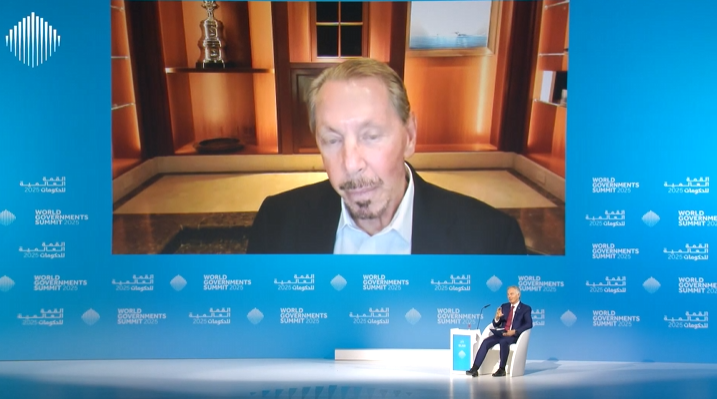If AI will make govts more efficient, who or what will citizens actually be voting for — the political party that controls the algorithms or the AI that makes decisions for the humans? perspective
At the World Governments Summit, Oracle founder Larry Ellison calls for the creation of a single, unified data platform for every country’s health data in order to feed AI systems and make governments more efficient.
In a one-on-one chat with former UK Prime Minister Tony Blair on “Reimagining Technology for Government,” Ellison proposed on Wednesday that in order for governments to provide better services to the people, there should be a single, unified platform and database to store all the information about a country.
Ellison spoke at length about health data, but he also said that information in the database should include social services data as well.
“If you want to improve population health, you have to take all of your healthcare data, your diagnostic data, your electronic health records, your genomic data […] and move it into a single, unified data platform”
Larry Ellison, World Governments Summit, 2025
“If you want to improve population health, you have to take all of your healthcare data, your diagnostic data, your electronic health records, your genomic data […] We have to take all of this data we have in our country and move it into a single, unified data platform, so we provide context,” Ellison told Blair.
“When we want to ask a question, we’ve provided that AI model with all the data they need to understand our country.
“That’s the big step. That’s the missing link. We need to unify all of the national data, put it into a database where it’s easily consumable by the AI model and then ask whatever question you like.”
The problem right now, according to Ellison, is that the health data to train AI models is scattered across some 3,000 databases, and he believes they should all be unified under one, solitary database.
“All this [fragmented] information we have about our country […] We need to take that and unify that into a single database, so when we ask questions, the data model has all the information it needs to answer the question, discover the insight, and recommend an action”
Larry Ellison, World Governments Summit, 2025
“These AI models are trained primarily by data that’s publicly available on the internet,” said Ellison.
“Most certainly your national health records aren’t available on the internet. That stuff is not available, but that’s very, very precious for your country because you’re using that data to improve population health and get better outcomes for individual citizens.
“Right now, countries’ data is fragmented […] You can pipe data from these 3,000 separate data sources into a single, unified database, and that’s what we need to do.
“We need to layer on top of all of this fragmented data — all this information we have about our country — and we need to take that and unify that into a single database, so when we ask questions, the data model has all the information it needs to answer the question, discover the insight, and recommend an action,” he added.
What the Stargate Project co-investor is proposing is that every citizen’s health data should be stored in a single database to feed the AI, so that the algorithms can tell governments what to do.
This can be interpreted as a step towards an algocracy — rule by algorithm.
But what does this mean for elections?
Ellison dances around the topic, but in the end, he basically says that when citizens are disappointed by the inefficiency of their elected representatives, they just simply vote them out.
But what happens if AI makes government more efficient, who or what will citizens be voting for then — a political party or an algorithm?
“People now expect in a democracy that the government provides a high level of service, or people get very dissatisfied, and they vote us out of office … [With AI] We can deliver a very, very high quality of service”
Larry Ellison, World Governments Summit, 2025
“People now expect in a democracy that the government provides a high level of service, or people get very dissatisfied, and they vote us out of office,” said Ellison.
“People talk about healthcare as being a human right. We can deliver healthcare at a much lower cost.
“Not only do we get much better outcomes, but by early diagnosis, better therapeutics, better population health, and we can get all of that as long as countries will put their data, their healthcare data, all of it in a single place where we can use AI to help manage the care of all of the patients and the population at large.
“We can deliver a very, very high quality of service, but that’s also true of a variety of social services, not just healthcare — if we’re having supplementary housing.
“And we can do it, and we eliminate almost all of the fraud,” he added.
“We can deliver a very, very high quality of service, but that’s also true of a variety of social services, not just healthcare — if we’re having supplementary housing“
Larry Ellison, World Governments Summit, 2025
If AI can make governments more efficient, then it stands to reason that the citizens will be happier with the outcomes.
But who or what will citizens actually be voting for?
Will we be voting for human representatives or the AI?
Will we be voting for the party that controls the AI?
Or will we vote for the AI that makes decisions for the party?
Will limited, representative forms of democracy give way to algocracies?
Image Source: Screenshot of Larry Ellison and Tony Blair via the World Governments Summit YouTube











